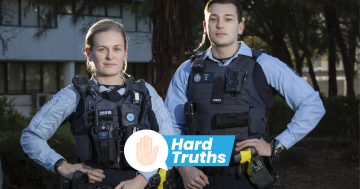
Escaping domestic violence is never easy, but living in a village where everyone knows each other has its unique challenges. Photo: Melanie Wasser.
WARNING: This story contains graphic details that some readers may find upsetting.
When Catherine (name withheld) moved to a secluded farm near Goulburn, she thought she’d be living the country dream.
Little did she know the farm’s isolation, away from close friends and family, would conceal escalating violence at the hands of her partner.
He had been the perfect guy when they met while Catherine was studying in Wollongong.
“Everything I said I was interested in, he was interested in,” says Catherine. “He loved going to the beach, camping, antiques, artwork and cooking.”
Only now can Catherine see there were red flags.
“I just thought, ‘He’ll be right – he’s stressed at work or had too much to drink’,” she says.
Red flags included being angered easily and showing signs of misogyny by being derogatory to women.
“But my family thought he was wonderful and encouraged me to settle down,” says Catherine. “It’s the one and only time I’ve gone against my gut.”
The violence began when Catherine fell pregnant.
“He spat in my face and told me to get a paternity test,” she says.
“I should have left then but I’d given up my job, deferred university and my children were with us. I was trapped.”
Catherine had two children from a previous relationship.
Escaping domestic violence is never easy, but living in a village where everyone knows each other has its unique challenges.
The pair had decided to purchase the farm following the birth of their first child, which was followed by their second.
By now, Catherine’s partner controlled her finances, had stopped her from working, and made sure he did the groceries so she rarely needed to leave the farm.
This meant no-one could see the marks on her neck from where she’d been strangled or the emotional scars from being yelled at for hours about inconsequential things such as the temperature or time of his dinner.
“The rules changed every day,” says Catherine.
She says the only time she stood up to him, he jumped on her back and smashed her head against a concrete floor.
“I started living on eggshells – my nerves were shot,” she says. “I lost my entire identity.”
Catherine decided she wouldn’t leave until her youngest was aged three and able to communicate in case she later visited her father without her mother by her side.
But she was well aware his behaviour was abusive and she was ready to share her horrific story when a village friend asked what was wrong.
However, Catherine’s decision to speak up set back her escape by two years because the next day the friend, whose husband was her partner’s friend, accused her of lying.
“I just lost all confidence at that point,” she says.
Catherine says her partner was a “social angel” to the outside world.
“Everyone saw a wonderful member of the community,” she says. “At the drop of a hat, he’d do anything for anyone. Our house was always open and he was always loving towards me in front of other people.”
Her second cry for help a few years later was also ignored.
Catherine had arrived at the local hospital with pneumonia, but refused the advice of the doctor to stay overnight, explaining she was scared to leave her children alone.
Instead of escalating Catherine’s concern, the doctor called her partner to pick her up.
It wasn’t until a car accident years later that another doctor pulled Catherine aside, concerned about her partner’s behaviour at the hospital.
“I asked her, ‘How did you know?'” she says.
“I picked the signs,” replied the doctor.
But it took Catherine’s son saying he didn’t want to go home to his dad after school one day to give her the courage to leave.
With $5 to her name, she packed the kids in the car and drove to her father’s house.
She got financial support through Centrelink and the keys to an apartment in a nearby town from a generous local real estate agent.
After eight years of working through the trauma, Catherine is now a survivor and is ready to put her story into words for a book she is writing.
If you’ve been affected by the issues raised in this story, or need help escaping domestic violence, call 1800RESPECT (1800 737 732).
Original Article published by Hannah Sparks on About Regional.




















